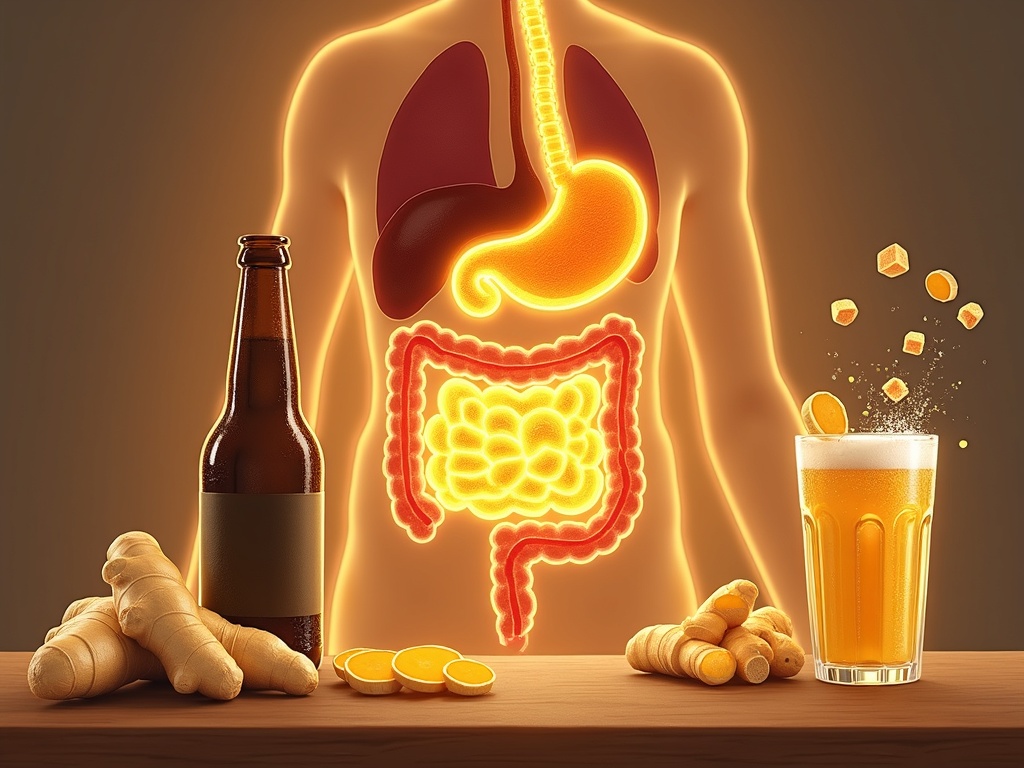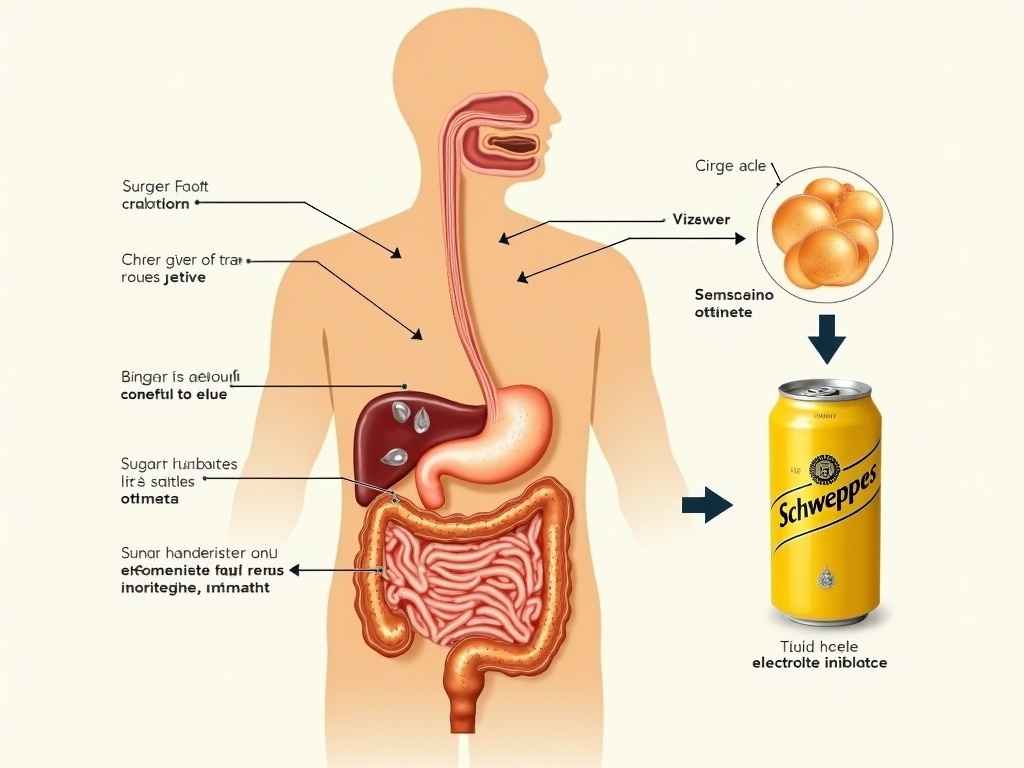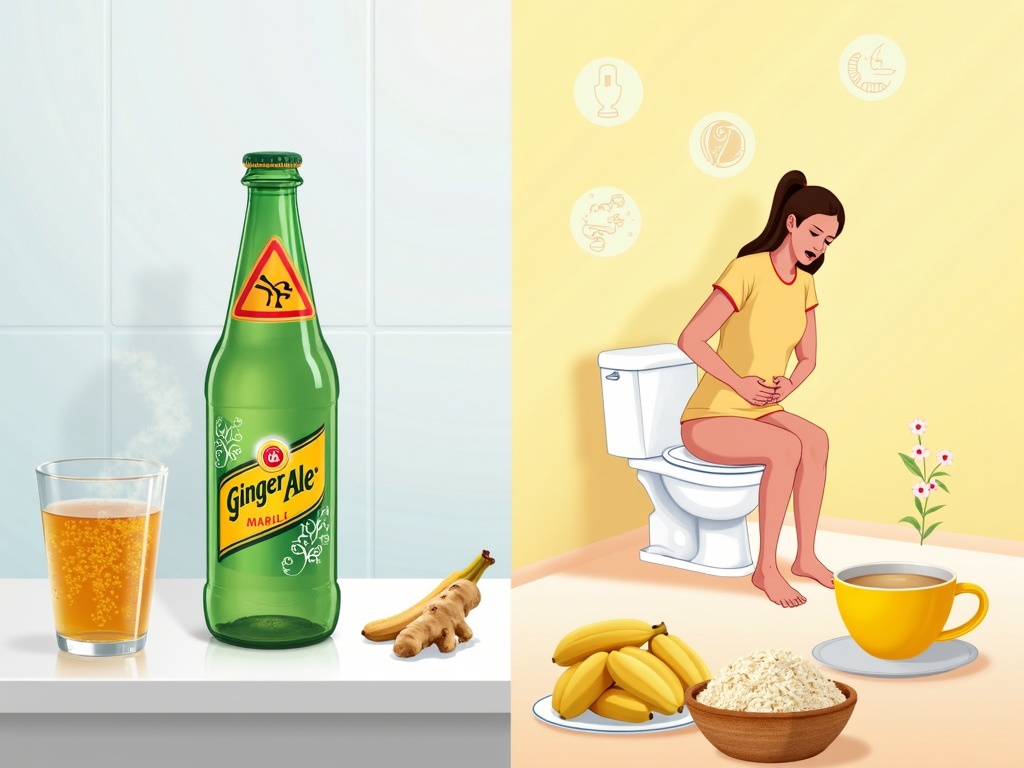No products in the cart.
Beverages News, Schweppes, Soft Drinks
Is Schweppes Ginger Ale Good For Diarrhea Or Not
Schweppes ginger ale provides little therapeutic benefit for digestive issues due to its reliance on artificial flavoring, minimal real ginger content, and high sugar levels.
Table of Contents
Key Takeaways
- Schweppes ginger ale lacks therapeutic amounts of real ginger, relying primarily on artificial flavoring instead of beneficial compounds like gingerols and shogaols.
- The high sugar content (32 grams per can) can worsen diarrhea by increasing water in the intestines through osmotic effects.
- Carbonation adds digestive stress by introducing gas that can result in bloating and discomfort.
- Medical professionals recommend rehydration solutions such as clear broths and plain water over sugary sodas for diarrhea treatment.
- Fresh ginger tea, ginger supplements, and the BRAT diet offer better digestive support than commercial ginger ale.
Lack of Real Ginger and Active Compounds
The artificial ginger flavoring found in Schweppes ginger ale contains almost none of the active compounds that make real ginger effective for easing digestive distress. The beneficial components, gingerols and shogaols, are present in either extremely small traces or are entirely absent from the beverage.
High Sugar Content May Worsen Symptoms
The sugar content is a major concern, especially for individuals experiencing diarrhea. One 12-ounce can of Schweppes ginger ale contains 32 grams of sugar. Such high sugar concentration can draw water into the intestines via osmotic effects, potentially worsening diarrhea and increasing stool frequency and volume.
Carbonation and Its Negative Effects
Carbonation doesn’t help the situation. Bubbles from carbonated beverages can introduce excess gas into the digestive tract, leading to more bloating, cramping, and discomfort. For a digestive system already under stress, this added pressure can be particularly unpleasant.
Recommended Alternatives by Medical Experts
Healthcare professionals typically recommend more effective hydration options during digestive distress. Oral rehydration solutions are considered the gold standard for combating diarrhea-induced dehydration. These drinks contain carefully balanced electrolytes and minimal sugar to support proper absorption of fluids.
Other suitable choices include:
- Clear broths that are easy to digest and rich in sodium
- Plain water, essential for rehydration without additives
- Medically formulated electrolyte drinks like Pedialyte or WHO-recommended formulas
Natural and Effective Ginger Alternatives
For those looking to harness the natural benefits of ginger, consider alternatives like:
- Fresh ginger tea: Steep sliced ginger root in hot water for 10–15 minutes to release its beneficial compounds.
- Ginger supplements: Look for products standardized for gingerol content to ensure consistent therapeutic benefits.
The BRAT Diet and Digestive Stability
The BRAT diet—bananas, rice, applesauce, toast—is a trusted and simple dietary approach to firm stool and support recovery during bouts of diarrhea. These bland, low-fiber foods are easy on the stomach and may help control symptoms without introducing additional irritation.
Conclusion and Recommendation
Given its lack of real ginger, excessive sugar, and carbonation, Schweppes ginger ale is not an effective remedy for digestive distress. In fact, it may make symptoms worse. Instead, opt for proven medical treatments and natural remedies. For persistent or severe digestive issues, always consult a trusted healthcare provider.
The Surprising Truth About Ginger and Digestive Health
I’ve discovered that ginger root’s reputation as a digestive aid isn’t just folk wisdom – it’s backed by solid science. Zingiber officinale has served traditional healers for centuries as their go-to remedy for stomach troubles and nausea.
The secret lies in ginger’s active compounds. Gingerols and shogaols pack powerful anti-inflammatory and antiemetic properties that directly target digestive discomfort. These bioactive substances work by blocking certain receptors in your digestive tract that trigger nausea and inflammation.
Clinical research validates what traditional practitioners have long known. Studies demonstrate that ginger effectively:
- Reduces nausea during pregnancy
- Helps cancer patients manage chemotherapy-induced stomach upset
- Prevents motion sickness
However, here’s where things get interesting for anyone considering Schweppes ginger ale for digestive issues.
The Dose Makes the Medicine
Therapeutic benefits require meaningful doses of actual ginger extract, not the trace flavorings found in most commercial ginger ales today. Modern versions contain artificial ginger flavoring or minimal real ginger content – far below therapeutic levels. You’d need to consume massive quantities of commercial ginger ale to approach medicinal doses, which would introduce problematic amounts of sugar and artificial additives.
Early ginger ale formulations told a different story. These original versions contained substantial amounts of real ginger and functioned more like medicinal tonics than soft drinks. Pharmacists and early beverage makers crafted these drinks specifically for their therapeutic properties, making them legitimate digestive aids.
I find it fascinating that somewhere along the commercial evolution, ginger ale transformed from medicine to mere refreshment. Today’s mainstream brands prioritize taste and shelf stability over therapeutic value. This shift explains why drinking modern ginger ale for diarrhea often disappoints people expecting real relief.
Fresh ginger root, ginger tea, or standardized ginger supplements deliver the compounds your digestive system actually needs. Clinical studies typically use 250-1000mg of ginger extract daily for therapeutic effects. Compare this to the negligible amounts in commercial sodas, and you’ll understand why reaching for ginger ale during digestive distress rarely provides meaningful relief.

What’s Actually in Schweppes Ginger Ale?
I need to break down exactly what you’re consuming when you reach for a Schweppes Ginger Ale, especially if you’re hoping it’ll help with digestive issues. The reality might surprise you.
The Ingredient Breakdown
Modern Schweppes Ginger Ale contains minimal to no real ginger. I can confirm this by examining the ingredient list:
- Carbonated Water
- High Fructose Corn Syrup
- Citric Acid
- Sodium Benzoate
- Natural Flavors
- Caramel Color
You’ll notice that actual ginger doesn’t appear anywhere on this list.
The term “Natural Flavors” catches many people’s attention, and rightfully so. This broad FDA-regulated term doesn’t guarantee any ginger content whatsoever. Companies can use various plant extracts and compounds to create that familiar ginger-like taste without including therapeutic amounts of actual ginger root.
Sugar Content and Health Implications
Here’s where things get concerning from a health perspective. A single 12 fl oz (355 mL) can contains 32 grams of added sugar. This amount meets or exceeds the daily sugar limits recommended by the American Heart Association, which suggests:
- No more than 25 grams of added sugar for women
- No more than 36 grams for men
When you’re dealing with diarrhea, consuming this much sugar can actually worsen your symptoms. High sugar content can draw water into your intestines through osmosis, potentially increasing loose stools rather than providing relief. This contradicts the very reason many people turn to ginger ale for digestive support.
I should mention that Schweppes Zero Sugar exists as an alternative. While this version eliminates the sugar concern by using artificial sweeteners, it still lacks any meaningful therapeutic ginger content. You’re essentially consuming flavored carbonated water with artificial additives.
The carbonation itself might provide some temporary comfort through burping, which can relieve gas pressure. However, this mechanical effect has nothing to do with ginger’s documented anti-nausea and digestive properties. You could achieve the same result with plain sparkling water.
If you’re specifically looking for ginger’s therapeutic benefits for digestive issues, you’d need to seek products that actually contain real ginger in meaningful amounts. Fresh ginger tea, ginger supplements, or ginger ales made with real ginger root would be far more effective options than conventional Schweppes Ginger Ale.
The bottom line is that Schweppes Ginger Ale functions more as a sugary soft drink than a digestive remedy. While it might taste pleasant and provide psychological comfort, don’t expect it to deliver the medicinal benefits that real ginger offers for gastrointestinal distress.
Why Schweppes Ginger Ale Can Worsen Diarrhea
Contrary to popular belief, I’ve found that Schweppes ginger ale often makes diarrhea worse rather than better. The high sugar content in this carbonated beverage creates a perfect storm for digestive distress when your system is already compromised.
Sugar’s Role in Osmotic Diarrhea
The sugar concentration in Schweppes ginger ale triggers what’s called osmotic diarrhea. This happens because your intestines can’t absorb all the sugar quickly enough, so it sits in your digestive tract and draws water from surrounding tissues. I’ve observed this effect repeatedly — the excess sugar acts like a magnet for fluid, pulling water directly into your intestines.
This process creates several problematic effects:
- More watery, frequent stools that intensify your existing condition
- Increased dehydration as your body loses even more fluid
- Prolonged recovery time as your digestive system struggles with the sugar load
- Greater electrolyte imbalance from excessive fluid loss
Sugary sodas like Schweppes are hypertonic solutions, meaning they contain more dissolved particles than your body fluids. When you drink them during diarrhea, they actually pull water out of your body tissues and into your gut. This is the opposite of what you need when fighting dehydration from loose stools.
Carbonation Compounds the Problem
The carbonation in Schweppes ginger ale adds another layer of digestive stress. CO2 gas expands in your stomach and intestines, creating uncomfortable bloating and cramping. During diarrhea, your digestive tract is already irritated and inflamed. Adding gas pressure only increases discomfort and can trigger more frequent bowel movements.
Carbon dioxide expansion becomes particularly problematic because it takes up space in your already sensitive digestive system. The gas can stimulate intestinal contractions, pushing contents through your system faster than normal. This acceleration prevents proper water reabsorption, which your body desperately needs during diarrhea episodes.
Schweppes ginger ale’s impact on digestion extends beyond just sugar and carbonation. The combination creates a compounding effect that works against your body’s natural recovery mechanisms. Instead of providing relief, this popular remedy often prolongs symptoms and delays healing.
The fluid loss from drinking sugary carbonated beverages during diarrhea can be significant. Your body loses water through the original diarrhea, then loses even more as the hypertonic solution draws additional fluid into your intestines. This double hit of dehydration can leave you feeling worse and potentially require medical intervention.
For anyone experiencing diarrhea, I recommend avoiding carbonated beverages entirely. The temporary pleasure of a familiar taste isn’t worth the potential setback in recovery. Clear, non-carbonated fluids with balanced electrolytes provide much better support for your healing digestive system.

Medical Recommendations for Diarrhea Treatment
Professional Medical Consensus on Fluid Replacement
Medical professionals prioritize rehydration and electrolyte replacement as the cornerstone of diarrhea treatment, not sugary beverages. The World Health Organization specifically recommends Oral Rehydration Solutions that contain precise glucose and electrolyte ratios designed for optimal absorption during gastrointestinal distress. These solutions work by utilizing the sodium-glucose co-transport mechanism in the intestinal wall, which remains functional even during diarrheal episodes.
The American Academy of Pediatrics explicitly advises against using sugary drinks as treatment options for diarrhea. Their position stems from clinical evidence showing that high sugar content can actually worsen diarrheal symptoms through osmotic effects in the intestinal tract. Many individuals reach for familiar beverages like ginger ale during illness, but this approach contradicts established medical guidance.
Why Standard Beverages Fall Short
Schweppes ginger ale may provide psychological comfort through its familiar taste and perceived medicinal properties, but it lacks the essential electrolytes your body desperately needs during diarrheal episodes. The beverage contains significant sugar levels that can actually exacerbate fluid loss rather than promote recovery.
Proper hydration therapies deliver measurable recovery benefits through several mechanisms:
- Sodium and chloride replacement restores cellular fluid balance
- Potassium replenishment supports muscle and nerve function
- Balanced glucose provides energy without osmotic complications
- Precise formulations prevent additional gastrointestinal irritation
Commercial oral rehydration solutions contain approximately 75 milliequivalents of sodium per liter, along with specific amounts of chloride, potassium, and glucose. This scientific formulation contrasts sharply with ginger ale’s composition, which primarily consists of carbonated water, high fructose corn syrup, and artificial flavoring.
Healthcare providers consistently recommend starting rehydration therapy immediately upon symptom onset. It’s advisable to keep oral rehydration packets in your medicine cabinet rather than relying on household beverages during gastrointestinal illness. These medical-grade solutions cost less than most commercial sodas while providing clinically proven therapeutic value.
The placebo effect shouldn’t be dismissed entirely—feeling better psychologically can support overall recovery. However, relying solely on comfort beverages delays proper treatment and may prolong symptoms. Medical evidence consistently demonstrates that appropriate rehydration therapy reduces both symptom duration and severity compared to inadequate fluid replacement strategies.
Better Alternatives for Digestive Relief
When dealing with diarrhea, I recommend focusing on drinks that properly hydrate your body while supporting recovery. Water remains your best choice for basic hydration, providing the foundation your body needs without any irritating additives.
Recommended Drinks for Digestive Recovery
These beverages offer superior digestive support compared to commercial sodas:
- Oral Rehydration Solutions like Pedialyte, Hydralyte, or CeraLyte deliver balanced electrolytes that your body loses during illness
- Clear broth from chicken or vegetables provides essential sodium and fluids in an easily digestible form
- Unsweetened herbal teas, particularly real ginger or peppermint, offer natural soothing effects without artificial ingredients
- Plain water serves as your primary hydration source throughout recovery
I strongly advise avoiding certain beverages that can worsen your symptoms. Sodas, including Schweppes ginger ale, contain high sugar levels and carbonation that may irritate your digestive system further. Full-strength fruit juices high in fructose or sorbitol can actually draw more water into your intestines, potentially worsening diarrhea. Caffeinated beverages like coffee, tea, or energy drinks act as diuretics and worsen dehydration. Dairy products become harder to digest during illness, as your body temporarily reduces lactase enzyme production.
The BRAT diet – consisting of bananas, rice, applesauce, and toast – provides excellent support during recovery. These bland, binding foods help firm up loose stools while being gentle on your irritated digestive tract:
- Bananas offer potassium replacement
- Rice provides energy without irritation
- Applesauce contains pectin that helps bind stools
- Toast delivers easily digestible carbohydrates
I find that combining proper hydration with appropriate food choices creates the most effective recovery approach. Start with small, frequent sips of recommended fluids rather than large amounts at once. This prevents overwhelming your already sensitive digestive system while ensuring consistent hydration. As symptoms improve, gradually reintroduce normal foods and beverages.
The Real Science Behind Ginger for Gut Health
Fresh ginger contains powerful bioactive compounds called gingerols and shogaols that genuinely support digestive health. These natural substances work by reducing inflammation in the gut and promoting healthy gastric motility. I’ve found that understanding this distinction is crucial when evaluating whether commercial ginger ale can provide real therapeutic benefits.
Therapeutic Dosing vs. Commercial Products
Research consistently shows that effective ginger supplementation requires specific concentrations to deliver measurable results. Clinical studies typically use 1–1.5 grams of standardized ginger extract to achieve therapeutic effects for digestive issues. This concentration provides a meaningful dose of the active compounds responsible for ginger’s anti-inflammatory and pro-motility properties.
Commercial ginger ale, however, contains minimal amounts of actual ginger extract. Most brands rely on artificial ginger flavoring rather than real ginger root. Even products that do include natural ginger provide only trace amounts—far below the therapeutic threshold established in scientific research. I often recommend examining ginger ale ingredients carefully to understand what you’re actually consuming.
Evidence-Based Alternatives for Digestive Relief
Fresh ginger root and concentrated ginger tea offer significantly more bioactive compounds than processed beverages. When preparing ginger tea, I suggest using fresh ginger slices steeped in hot water for at least 10 minutes to extract maximum beneficial compounds. This method delivers higher concentrations of gingerols and provides genuine digestive support.
The placebo effect can create temporary comfort when consuming ginger ale during digestive distress. While this psychological relief shouldn’t be dismissed entirely, it doesn’t address the underlying physiological needs during diarrhea episodes. Proper rehydration remains the primary medical priority, requiring:
- Electrolyte replacement
- Adequate fluid intake
- Avoidance of sugary carbonated beverages
Clinical evidence supports ginger’s effectiveness for various digestive conditions, including nausea and general stomach upset. However, diarrhea requires specific management strategies that focus on:
- Preventing dehydration
- Restoring electrolyte balance
Commercial ginger ale’s high sugar content can actually worsen diarrhea by drawing additional water into the intestines through osmotic effects.
I recommend consulting healthcare providers when experiencing persistent digestive issues rather than relying on home remedies alone. Effective diarrhea management typically involves:
- Oral rehydration solutions
- Dietary modifications
- Medical intervention, if necessary
Fresh ginger can complement these approaches but shouldn’t replace evidence-based treatments.
The carbonation in ginger ale may provide temporary stomach settling effects for some individuals. This mechanical action differs from ginger’s biochemical properties and occurs regardless of whether the beverage contains actual ginger compounds. Understanding this distinction helps make informed decisions about digestive remedies.
Quality ginger supplements offer standardized concentrations that ensure consistent therapeutic dosing. These products undergo testing for purity and potency, providing reliable alternatives to commercial beverages. I always recommend choosing third-party tested supplements when seeking concentrated ginger benefits.
Natural ginger preparations require proper preparation techniques to maximize bioavailability. Crushing or grating fresh ginger releases more active compounds than whole pieces. Heat application through brewing also increases the extraction of beneficial substances, making properly prepared ginger tea more therapeutically valuable than cold commercial alternatives.
The timing of ginger consumption affects its digestive benefits. Taking ginger before meals can help prevent digestive discomfort, while consuming it during active symptoms may provide some relief. However, during acute diarrhea, maintaining hydration takes precedence over any potential ginger benefits.
Research continues to explore ginger’s mechanisms of action in digestive health. Current studies focus on optimal dosing protocols and delivery methods for various gastrointestinal conditions. This ongoing research reinforces the importance of using evidence-based concentrations rather than relying on flavored beverages for therapeutic effects.
Commercial ginger ale serves as a pleasant beverage but lacks the medicinal properties needed for effective digestive support. I encourage people to choose appropriate remedies based on scientific evidence rather than marketing claims or traditional assumptions about flavored drinks.
Direct Answer: Is Schweppes Ginger Ale Good for Diarrhea?
I need to be clear from the start: Schweppes Ginger Ale isn’t good for treating diarrhea. Despite what you might have heard about ginger helping digestive issues, this popular carbonated beverage contains virtually no real ginger and includes ingredients that can actually make your symptoms worse.
The main problems with using Schweppes Ginger Ale for diarrhea stem from its composition. High sugar content creates an osmotic effect in your intestines, potentially pulling more water into your digestive tract and worsening loose stools. Carbonation adds another layer of concern, as the bubbles can increase gas production and create additional discomfort in an already sensitive digestive system.
Real ginger does have proven anti-nausea and digestive properties, but Schweppes Ginger Ale contains only artificial ginger flavoring. You won’t get any of the beneficial compounds like gingerol that make fresh ginger effective for stomach upset. The amount of actual ginger extract, if any, is negligible compared to what you’d need for therapeutic effects.
Why Schweppes Can Make Diarrhea Worse
Several specific components in Schweppes Ginger Ale can aggravate diarrhea symptoms:
- High fructose corn syrup draws water into your intestines through osmosis, increasing stool volume and frequency
- Carbonation creates gas bubbles that can cause bloating and abdominal cramping
- Artificial sweeteners in some varieties can have laxative effects
- Caffeine content may stimulate bowel movements and contribute to dehydration
- Lack of electrolytes means you’re not replacing what you lose during diarrhea episodes
Dehydration becomes a serious concern when you’re dealing with diarrhea. Your body loses significant amounts of water and essential minerals like sodium and potassium. Schweppes Ginger Ale doesn’t provide adequate electrolyte replacement, and its sugar content can actually increase fluid loss.
I’ve seen people reach for ginger ale thinking it’s a safe, gentle option for upset stomachs. This misconception likely stems from memories of being given flat ginger ale during childhood illnesses. However, even flat Schweppes still contains the problematic sugar levels that can interfere with recovery.
Instead of relying on Schweppes for diarrhea relief, consider proven alternatives. Clear broths provide electrolytes without excess sugar. Plain water helps with hydration, though adding a pinch of salt and a small amount of sugar creates a basic rehydration solution. If you want the benefits of real ginger, try fresh ginger tea or ginger capsules designed for digestive support.
The BRAT diet (bananas, rice, applesauce, toast) remains a time-tested approach for managing diarrhea. These foods are easy to digest and help firm up loose stools without introducing ingredients that might worsen symptoms.
I understand the appeal of reaching for something familiar and readily available when you’re feeling unwell. However, treating diarrhea effectively requires focusing on hydration with appropriate fluids and avoiding foods and drinks that can perpetuate the problem. Schweppes Ginger Ale, unfortunately, falls into the latter category due to its sugar content and lack of beneficial ingredients.
If your diarrhea persists for more than a couple of days, shows signs of blood, or comes with severe dehydration symptoms, consulting a healthcare provider becomes essential. They can recommend proper rehydration solutions and determine if underlying conditions require treatment.

Sources:
Cleveland Clinic, “What to Drink When You Have Diarrhea”
Mayo Clinic, “Diarrhea: Diagnosis & Treatment”
Healthline, “Is Ginger Ale Good for an Upset Stomach?”
Bode & Dong, “The Amazing and Mighty Ginger,” Herbal Medicine: Biomolecular and Clinical Aspects, 2nd Edition
American Heart Association, “Added Sugars”


